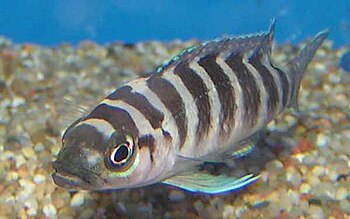Cichlids are an adorable group of freshwater fishes highly prized for their rich coloration. They are considered among the most specialized and diverse group of fishes anywhere in the world. There are an estimated 1300 or more species existing, all with an unimaginable number of size and color combinations. Those freshwater Oscars and angelfish we all knew to be aquarium fish species are actually cichlids. The African cichlid is one two classifications widely displayed in aquariums these days.
 |
| Adult Neolamprologus cylindricus in an aquarium (Photo credit: Wikipedia) |
This particular fish group comes from three African lakes: Lake Victoria, Lake Malawi, and Lake Tanganyika. With Lake Malawi being the second deepest and at the same time third largest lake in the African landscape, about a thousand species or more of the Lake Malawi cichlids are considered the most beautiful in the world, whether they live in the freshwater or otherwise.
Cichlids found in Africa are especially known for displaying beautiful and enchanting patterns complete with an array of colors not surprisingly typical in most species of freshwater species. Everyone agrees that such types are also the most colorful among the species. They are most elegant to observe at, especially when they flaunt their impressive social behavior and intelligence.
African cichlids are designed by nature to adapt to captivity, which is why you can see so many of them available in pet shops anywhere these days. They are also hardy, which means maintaining them is much easier compared to others. This great characteristic is doing so many things to help them survive in new environments and specific geographic locations.
African cichlids are also known to have varied and interesting behaviors. Some types are known to carry their eggs and young into their mouths. The male functions to fertilize the eggs, while the female picks them up and incubates them inside the mouth for about three weeks or more depending on the species. Researchers believe this behavior is an evolutionary advancement of their specific reproductive methods, since the process significantly provides offspring protection during delicate development periods. Even if the young are already released, mothers are still driven by instinct to protect them inside their mouths whenever threatened.
This particular species are also known to be more aggressive compared to their counterparts and extremely territorial, which may also explain the link with their highly predatory features. When on the wild, they are often found living together in schools or groups of the same species. The mature ones are not hospitable since they function to guard the territory. They may even be aggressive to other fishes and even cichlids of varying species.
Cichlids in general express both their dominance and timidity mainly through their colors; pale fishes could be stressed out, or they could also be submissive. Bright-colored fish types on the other hand are usually dominant as they are also more aggressive than other cichlids. Whenever male cichlids lose territory, they also lose their bright colors. Some others even hide while retaining their dominance color just to pretend of their status, which also means to keep their hopes of attracting mates strong. And that's the African cichlid for you.
To learn more about cichlid fish, go to the Lifestyles100 web site or pick up the Nook book, Cichlid Care Secrets at Barns and Noble. Article Source: EzineArticles |


No comments:
Post a Comment